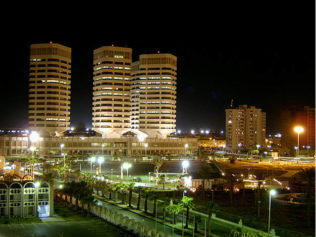An upbeat chronicle of very hard rock in a very hard place, Death Metal Angola is one of the livelier and more enticingly exotic additions to the ever-burgeoning music-documentary sub-genre. An American-Angolan co-production that represents a likably promising big-screen debut for Detroit-born globetrotter Jeremy Xido, this brisk survey of ear-splitting bands in an African country recovering from horrific civil war will prove a popular choice for festivals and small-screen programmers alike following its December world premiere in Dubai and European bow in Rotterdam.
Known for most of the 20th century as Nova Lisboa (“New Lisbon”), the city of Huambo is now the second-biggest in Angola, the former Portuguese colony in south-west Africa that’s triple the size of California. As the film says, Huambo was “completely ravaged and brutalized” by the civil war that convulsed the nation from independence in 1975 until 2002. Xido’s main focus is the city’s Okutiuka orphanage run by tireless Sonia Ferreira, who with her boyfriend Wilker Flores organizes the country’s first rock festival to help the institution by raising awareness and funds.
The picture’s first hour introduces us to the orphanage, Sonia, Wilker and the “death metal” bands such as the one with which Wilker performs — cue an amusing contrast between his soft-spoken off-stage persona and the guttural growl that’s his preferred vocal style. Then in the closing half-hour, the picture becomes a kind of low-fi variant of Jeffrey Levi-Hinte’s Soul Power (2008) as the day of the festival (suddenly) dawns and back-stage chaos sees the organizers struggle to meet the announced and extremely optimistic 6 p.m. start time.
But whereas the 1974 Zaire mega-concert presented in Soul Power showcased international headliners like James Brown, Miriam Makeba and B.B. King, only the most adventurous of aficionados will be familiar with Death Metal Angola‘s array of acts such as Before Crush, Dor Fantasma and Nothing To Lose. Xido and his editor, Todd Holmes, provide a functional primer to the scene, their economic briskness occasionally a little frustrating. It’s never really explained, for example, how much of a following these bands have; how they fit in (or otherwise) with Angola’s other music scenes; or if their lyrics and off-stage activities address the bloody divisions which left much of their country in ruins. Metal music can, for all its spiky swagger, be among the most conservative and apolitical of musical forms, and a little more cultural context would have been welcome.
Instead, Xido is drawn repeatedly to the eminently movie-genic orphanage and its young residents, and there’s the sense that there are dozens of potential angles and stories here which could be fruitfully explored in a picture whose professional slickness and carefully-composed images don’t really match the DIY roughness of the bands on view. The unrealized potential of Angolan youth, for example, is touchingly epitomized by ill-fated young graffiti artist Yakuza, whose story is only fleetingly mentioned here…
Read More: hollywoodreporter.com


